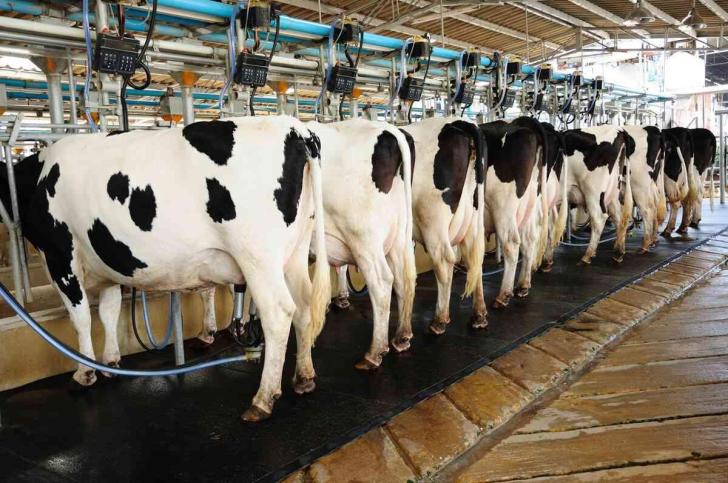News / National
+120k litres of Zimbabwean milk rejected for export
02 Aug 2025 at 12:18hrs |
0 Views

Zimbabwe's dairy sector is under scrutiny after it was revealed that over 120,000 litres of milk earmarked for export were rejected by mid-year due to contamination, a staggering increase from the 39,000 litres turned away in 2024.
The alarming figures were disclosed by Dr. Lawrance Dengenya, Director of Veterinary and Technical Services in the Ministry of Lands, Agriculture, Fisheries, Water and Rural Development, during the 11th Annual General Meeting of the Zimbabwe Association of Dairy Farmers (ZADF), held recently.
Dr. Dengenya said the sharp rise in milk rejections is a worrying trend that threatens the growth of Zimbabwe's export-oriented dairy industry, which currently serves regional markets including Botswana, Malawi, and Zambia.
"Trade facilitation is one of our mainstays, and we can safely say that dairy products are being exported throughout the region," Dr. Dengenya said. "However, it is sad to note that this year alone we have rejected 120,000 litres of milk. That's almost triple last year's figure."
He emphasized the urgent need for farmers and stakeholders to implement robust quality assurance mechanisms to curb the loss, calling it a major economic setback for the industry.
"If we calculate the economic loss from both the raw and retail value of the rejected milk, the figures are significant," he said. "We need a national strategy to reduce milk rejection rates. Eliminating waste is key to sustaining the industry."
Dr. Dengenya attributed the rejections mainly to two causes: high traces of antibiotics in the milk and adulteration, particularly through the illegal addition of water.
"The presence of antibiotics is the major issue," he noted. "We need to ask whether our testing methods are accurate, sensitive, and harmonised. Do we have secondary confirmatory tests to ensure the findings? What drugs are farmers using, and are withdrawal periods being observed?"
He also raised concerns about adulteration practices. "I want to believe farmers are not adding water into milk," he said. "But we need to be honest and vigilant. These practices damage our reputation and our market access."
Meanwhile, efforts to safeguard the dairy sector from disease threats are also gaining momentum. Dr. Dengenya confirmed that Zimbabwe has started manufacturing the local BOLVAC vaccine to fight Foot and Mouth Disease (FMD), which remains a persistent risk for livestock, particularly dairy herds.
"We have a well-organised plan to ensure vaccines are available, especially in outbreak-prone areas. We will ringfence vaccine stock for dairy farmers to protect this vital value chain," he said.
Dr. Dengenya also pointed to January disease as another key concern but reiterated that vaccines, including BOLVAC, are being made available to dairy and beef farmers alike.
The twin challenges of milk rejection and livestock disease highlight the need for tighter regulatory oversight, improved on-farm practices, and stronger public-private collaboration in Zimbabwe's dairy sector.
With export potential on the rise, industry leaders say restoring quality standards and curbing losses are essential if Zimbabwe is to maintain competitiveness in regional markets.
The alarming figures were disclosed by Dr. Lawrance Dengenya, Director of Veterinary and Technical Services in the Ministry of Lands, Agriculture, Fisheries, Water and Rural Development, during the 11th Annual General Meeting of the Zimbabwe Association of Dairy Farmers (ZADF), held recently.
Dr. Dengenya said the sharp rise in milk rejections is a worrying trend that threatens the growth of Zimbabwe's export-oriented dairy industry, which currently serves regional markets including Botswana, Malawi, and Zambia.
"Trade facilitation is one of our mainstays, and we can safely say that dairy products are being exported throughout the region," Dr. Dengenya said. "However, it is sad to note that this year alone we have rejected 120,000 litres of milk. That's almost triple last year's figure."
He emphasized the urgent need for farmers and stakeholders to implement robust quality assurance mechanisms to curb the loss, calling it a major economic setback for the industry.
"If we calculate the economic loss from both the raw and retail value of the rejected milk, the figures are significant," he said. "We need a national strategy to reduce milk rejection rates. Eliminating waste is key to sustaining the industry."
Dr. Dengenya attributed the rejections mainly to two causes: high traces of antibiotics in the milk and adulteration, particularly through the illegal addition of water.
He also raised concerns about adulteration practices. "I want to believe farmers are not adding water into milk," he said. "But we need to be honest and vigilant. These practices damage our reputation and our market access."
Meanwhile, efforts to safeguard the dairy sector from disease threats are also gaining momentum. Dr. Dengenya confirmed that Zimbabwe has started manufacturing the local BOLVAC vaccine to fight Foot and Mouth Disease (FMD), which remains a persistent risk for livestock, particularly dairy herds.
"We have a well-organised plan to ensure vaccines are available, especially in outbreak-prone areas. We will ringfence vaccine stock for dairy farmers to protect this vital value chain," he said.
Dr. Dengenya also pointed to January disease as another key concern but reiterated that vaccines, including BOLVAC, are being made available to dairy and beef farmers alike.
The twin challenges of milk rejection and livestock disease highlight the need for tighter regulatory oversight, improved on-farm practices, and stronger public-private collaboration in Zimbabwe's dairy sector.
With export potential on the rise, industry leaders say restoring quality standards and curbing losses are essential if Zimbabwe is to maintain competitiveness in regional markets.
Source - Health Times
Join the discussion
Loading comments…


























